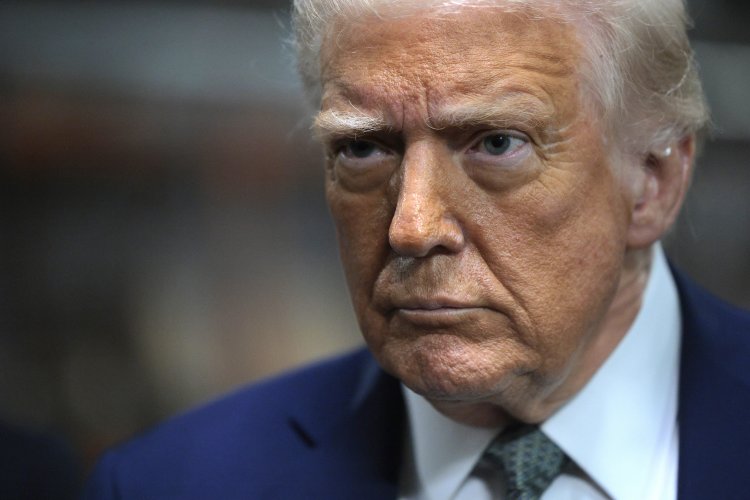The Significant Submission: How Trump Compelled Elite Institutions to Conform to His Demands
An exploration of the insights we can gain from the way institutions have succumbed to Trump’s extraordinary revenge campaign.

One after another, these elite entities have responded with capitulation and compliance.
While the specifics differ, two key themes emerge. First, there is a far more organized and determined effort than seen during Trump’s first term to bring institutions that have attracted his ire back into line. Second, it is surprising how swiftly these supposedly powerful and independent entities have reacted, akin to a child surrendering lunch money to a bully on the way to school.
Together, these events signify a dramatic new chapter in American history: The Great Grovel.
Prestigious law firms have bowed to threats about their business viability; for instance, Paul, Weiss, which opposed Trump in his first term, has pledged $40 million in pro bono legal services to causes he supports. Likewise, Skadden Arps, one of the largest law firms globally, struck a deal to provide $100 million in free legal services supporting administration-friendly initiatives, even before Trump took any punitive measures against them.
Notably, ABC News settled a defamation lawsuit with Trump for $15 million, to benefit his future presidential library, while CBS News appears ready to settle for even more. The Washington Post and the LA Times, both owned by billionaires sympathetic to Trump, have tailored their editorial content in ways that gratify the White House. Columbia University, the alma mater of Alexander Hamilton, agreed to implement nine policy changes to potentially restore $400 million in federal funding. Other universities have recruited Republican lobbyists to maintain favorable relations with the president.
Recently, a team of PMG reporters sought to uncover common threads among these incidents, interviewing key figures at targeted institutions and individuals within Trump’s circle. Here are four conclusions drawn from their findings:
A Transactional Age
Leaders of institutions that complied with Trump’s requests do not accept the notion that the foundations of American governance have transformed, ushering in a New Normal. They believe there is a yearning for a return to the Old Normal, where familiar revenue streams and profit margins remain stable.
In a firm-wide letter on March 23, Brad Karp, chair of Paul, Weiss, justified his decision to strike a deal with Trump by stressing “the need to ensure, above all, that our firm would survive.” Trump’s executive order, which mirrored similar actions against firms like WilmerHale, Perkins Coie, and Jenner & Block, stripped attorneys of security clearances and limited their ability to engage in federal work. Karp described the situation as an “existential” threat to the firm. However, more than 100 alumni expressed concern in a letter to Karp, labeling the deal a “permanent stain on the face of a great firm that sought to gain a profit by forfeiting its soul.”
Former attorneys noted that Karp’s move reflects a power shift and a change in strategy over the past eight years. Paul, Weiss’s corporate practice has expanded significantly since Trump’s initial administration. In 2017, when partners worked 12-hour shifts at airports in response to Trump’s Muslim ban, the firm recorded revenue of just over $1 billion. Last year, revenue exceeded $2 billion, according to Law.com.
“You bring people together on the corporate side, you’re not intent on fighting,” one former attorney stated. “Whereas on the litigation side, you have to be a fighter.”
Skadden’s executive partner, Jeremy London, shared details about his negotiation in a firm-wide email to staff, stating, “We chose to engage proactively and constructively with the Administration to align on a productive path forward without the issuance of an executive order.” “We entered into the agreement the President announced today because, when faced with the alternatives, it became clear that it was the best path to protect our clients, our people, and our Firm.”
The firms appear to have made the calculated choice that yielding to Trump’s demands would be a minimally unpleasant temporary measure leading swiftly back to business as usual.
Exceptions exist: Perkins Coie, Jenner & Block, and WilmerHale—firms facing similar threats from Trump—have chosen to stand against him in court.
Even Trump seems taken aback by the extent of the capitulation: “They’re all bending and saying, ‘Sir, thank you very much,’” he remarked at a White House event for Women’s History Month. “Nobody can believe it, including law firms that have been so horrible… and they’re just saying, where do I sign?”
Pressure Points
Trump’s actions have starkly illustrated how intertwined many wealthy private institutions are with federal government finances and policies, although this is not a new phenomenon. The difference now is the willingness of Trump and his aides to leverage this connection rather openly. They have exposed these institutions as more susceptible to intimidation than their leaders may have realized.
Earlier this month, Columbia complied with nine demands from the Trump administration to potentially unfreeze $400 million in U.S. federal research funding—a significant hit to the institution, which relies on about $1.3 billion in government grants yearly to support its $6.3 billion operating budget. Changes implemented by the university followed a series of discussions regarding their support for Jewish students in light of pro-Palestinian protests the previous year. These changes included mandating that masked protesters reveal their identities and empowering campus safety officers to make arrests.
“A Columbia spokesperson stated that “We have been advancing our work to address discrimination and harassment for months in a variety of ways, including engagement with government agencies to address ongoing concerns.” However, university leaders understood that “lifesaving research” would be “seriously curtailed” without that $400 million in crucial funding; compliance was made clear as the only way to regain access to it.
The dynamics at play in The Great Grovel reveal a paradox. In theory, wealthy institutions with diverse revenue sources should be more insulated from external pressure. However, in practice, the opposite has occurred as these wealthy entities perceive more vulnerabilities and potential profits, thereby incentivizing compliance.
The decision to settle the libel case was met with considerable dissent at ABC News, where many journalists believed that an independent news organization should fight vigorously for its interests. But ABC represents only a fraction of the Walt Disney Corp., where executives seemingly concluded that defending the lawsuit could risk embarrassing revelations during the discovery phase and might harm the overarching business. “It sent a chilling message to the newsroom that they could be sold out by the higher ups and by the corporate division,” remarked an individual familiar with the situation who spoke on condition of anonymity. A Disney spokesperson declined to comment.
Similarly, it is difficult to imagine a prior generation of Washington Post publishers contributing $1 million to a president’s inauguration fund. Yet, that is precisely what Jeff Bezos, the owner of the Post, did for Trump. Additionally, Amazon, the company he founded and where he remains a major shareholder, signed a $40 million deal with Melania Trump to distribute a documentary about her, alongside other content ventures.
The Imbalance of Power
Much of the focus on Trump’s newfound ideological resolve during his second term has centered on senior advisors like Stephen Miller and budget director Russ Vought, who have played roles in the effort to wield executive leverage against external institutions. However, the retribution initiative is a collective effort involving Trump allies from various agencies and external advisers.
“Retribution is an important component of justice,” stated Mike Davis, a Trump ally running an outside judicial advocacy group. “It restores the victims and serves as a powerful deterrent.”
Davis is one among a small group advising Trump on strategies to confront his political adversaries. The push against law firms is driven externally by longtime Trump associates Boris Epshteyn and Jason Miller, with Deputy Attorney General Todd Blanche also involved, according to two sources familiar with the discussions who spoke anonymously. Inside the administration, Stephen Miller plays a role.
While Trump maintains a wide circle of support, his targets have often found themselves isolated.
“There’s a giant collective action problem because everybody’s looking out for number one,” commented the Disney associate.
So far, universities have not made an effective collective effort to resist Trump’s encroachments, whether at Columbia or elsewhere. Though the Associated Press faced backlash for being expelled from the White House press pool, most news organizations continued with their routines. Major law firms have yet to issue a joint condemnation against Trump’s moves affecting their peers.
“If law firms and businesses and others within the private sector choose not to stand up and front a resistance to this power that [Trump] is claiming, but which the Constitution does not give him, then he will have that power,” remarked Mary Spooner, a former Paul, Weiss attorney. “But it becomes much, much harder to resist when individual organizations and institutions and corporations are forced to resist alone.”
Humiliation is the Point
Trump’s campaign against institutions has ideological roots, fueled by disdain for what critics describe as illegitimate government subsidies and the alleged “wokeness” embedded in their diversity, equity, and inclusion practices.
Yet, an equally significant driving force is psychological.
Trump has targeted law firms using attorneys involved in investigations against him or those who have sued him. Media organizations are not spared, as Trump lashes out at those he perceives as biased against him. His longstanding grievance with Columbia dates back to the 1990s when his attempt to sell property to the school for over $400 million fell through due to a lower offer. The institution recently became a focal point of global protests led by pro-Palestinian movements, positioning it as a case study for conservatives observing elite, urban, progressive institutions as potential targets.
Insiders involved in negotiations indicate that Trump and his supporters value public shows of humiliation—like the settlements with ABC and law firms—just as much as they do the substantive details of their original complaints.
Critics assert that Trump has nurtured his grievances like a supervillain indulging in a long-held vendetta. “What you see here is a group of people who think they missed an opportunity the first time around—that they didn't fully realize what they now believe to be the powers of the presidency,” remarked Ty Cobb, a former White House lawyer during Trump’s first term. “They’re playing to Trump’s strengths, which is as a mob boss.”
However, it remains uncertain whether Trump’s team would interpret this as an insult. On the contrary, those within his inner circle take pride in demonstrating to the world what they have long understood: during his four years out of power, Trump and his allies were actively strategizing about how they would wield their power upon returning.
Anna Muller for TROIB News












